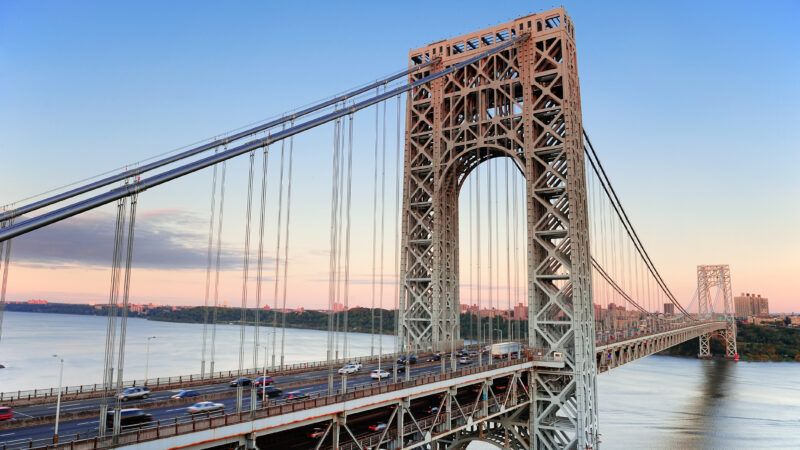New Jersey Congressmen Want To Exempt New Jersey Drivers From New York's Congestion Tolls
The bill would strip New York of federal transit funding if Manhattan-bound Garden State motorists aren't spared from new tolls.

It can be tough to grasp the idea that a driver isn't just in traffic; he is traffic. As a result, a lot of people think policies to reduce traffic congestion should apply to someone else over there.
Witness a bipartisan bill from two New Jersey congressmen, Democrat Josh Gottheimer and Republican Jeff Van Drew. It would strip New York City's public transit system of federal funding if Garden State drivers aren't exempt from the congestion charges that might soon be applied to motorists entering Manhattan.
"The proposed $3,000 a year congestion tax is such a slap in the face to New Jersey commuters," said Gottheimer in a press release announcing the reintroduction of the Anti-Congestion Tax Act. "We're fighting back against the proposed New York congestion taxes that are targeting hardworking Jersey families for simply driving into Manhattan."
The "congestion tax" being targeted is a variable fee that New York will soon charge motorists who enter Manhattan below 60th Street. The idea is to reduce traffic congestion by encouraging carpooling, transit use, or travel at off-peak hours.
How much these charges will be, how they might vary throughout the day, and who exactly will have to pay them are decisions that will be made by the Metropolitan Transportation Authority (MTA)—the state agency that runs buses and trains in the New York City area.
The MTA will also receive these congestion tolls. The money will then go toward capital improvements for mass transit in New York City and on MTA-run commuter rail lines running out to Long Island and Connecticut.
Such congestion pricing (or cordon pricing) schemes are already in place in a number of cities, including London, Singapore, and Stockholm, where they've proven successful at reducing traffic congestion in the city center. New York would be the first city in the U.S. to implement the policy.
The idea has support from transportation experts of all ideological stripes. Left-wing transit advocates like its potential to encourage transit ridership. Free market wonks like the idea of pricing roads to speed up commute times.
This bill has something for both groups to hate.
Transit advocates have obvious reasons to oppose its provision forbidding grants from the feds' Capital Investment Program to the MTA unless drivers entering Manhattan from New Jersey are exempt from tolls. That would take billions away from the MTA-sponsored projects, either by cutting off federal funds or by forcing them to forgo the revenue they would have gotten from New Jersey motorists.
Folks who support congestion pricing but are less hot on federal transit funding will dislike a provision giving commuters a tax credit to cover whatever congestion tolls they pay entering Manhattan from New Jersey. That would eliminate their incentive to, you know, reduce congestion.
Gottheimer first introduced this bill in 2019, the same year the New York legislature created its congestion pricing program. Around the same time, everyone from truckers to police to representatives of New York's outer boroughs started pushing for their own targeted exemptions. It'll be a while before we know the precise details of who will actually receive those exemptions.
New York's program was supposed to be up and running by January 2021. The need to conduct a federally mandated environmental review of the program, and the political wrangling that came with that, ensured that deadline was missed. The hope now is to have a toll system up and running by 2022.
If it's successful at reducing traffic and speeding up travel times, New York City's congestion pricing scheme could be a model for other gridlocked American cities to emulate. Exempting all New Jersey commuters would ensure it becomes a cautionary tale of what not to do.
Rent Free is a weekly newsletter from Christian Britschgi on urbanism and the fight for less regulation, more housing, more property rights, and more freedom in America's cities.


Show Comments (56)